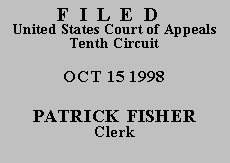

| JOSE RIDEOUT,
v.
H.N. SCOTT, Warden, Joseph Harp
Correctional Center, VICKIE
SHOECRAFT, Citizen of Lexington,
Oklahoma |
No. 98-6231
(D.C. No. 97-CV-41) |
Mr. Rideout sued the defendants under 42 U.S.C. § 1983, alleging a violation of his civil rights when he was sentenced to 15 days of disciplinary segregation for refusing an order to move into a cell with another inmate. On March 11, 1998, a magistrate judge recommended dismissal of his suit as frivolous. (Entry no. 50.)
Mr. Rideout acknowledges that he received a copy of the magistrate's Report and Recommendation on March 12, 1998. The report advised him of his right to object no later than March 26, 1998, and that failure to object would result in waiver of his right to appeal the report's factual findings and legal conclusions. On March 31, 1998, the district court noted that no objections had been filed by either party, adopted the magistrate's report and recommendation in its entirety, and dismissed the suit with prejudice. (Entry no. 52.)
On April 20, 1998, Mr. Rideout filed a Rule 60(b) motion seeking relief from the district court's judgment, contending that his "conditions of confinement" had prevented him from timely filing his objections. (Entry no. 57.) The district court denied the motion, finding that none of Mr. Rideout's "myriad reasons" for failing to timely object provided a basis for relief under Rule 60(b). Mr. Rideout now appeals, arguing again that his conditions of confinement created "excusable neglect" for his delay. See Fed. R. Civ. P. 60(b)(1).
Rule 60(b) motions are reviewed for abuse of discretion. Stubblefield v. Windsor Capital Group, 74 F.3d 990, 994 (10th Cir. 1996). "[I]n determining whether a district court abused its discretion, we are mindful that '[r]elief under Rule 60(b) is extraordinary and may only be granted in exceptional circumstances." Cashner v. Freedom Stores, Inc., 98 F.3d 572, 576 (10th Cir. 1996)(quoting Bud Brooks Trucking, Inc. v. Bill Hodges Trucking Co., 909 F.2d 1437, 1440 (10th Cir. 1990)). "[O]nly if we find a complete absence of a reasonable basis and are certain that the district court's decision is wrong do we reverse." Pelican Prod. Corp. v. Marino, 893 F.2d 1143, 1147 (10th Cir. 1990). Furthermore, review of a denial of a Rule 60(b) motion is confined only to review of the order of denial and does not extend to review of the underlying judgment. See Van Skiver v. United States, 952 F.2d 1241, 1243 (10th Cir. 1991), cert. denied, 506 U.S. 828 (1992).
Mr. Rideout states that a series of circumstances during March 12-26, 1998 hindered his ability to respond to the magistrate judge's report. The specific circumstances of Mr. Rideout's confinement, while perhaps preventing him from filing his substantive objections within the 15-day limit, did not entirely prevent him from seeking leave of the district court for an extension of time.(1) In short, Mr. Rideout's failure to make timely objections to the magistrate judge's report and recommendation, or even to seek an extension of time to file his objections, waived appellate review of the magistrate judge's factual findings and legal conclusions. See Moore v. United States, 950 F.2d 656, 659 (10th Cir. 1991). As a result, his attempt to reopen the district court's judgment dismissing his case is without merit.
For the reasons stated above, we DENY the motion to proceed IFP under 28 U.S.C. § 1915(e)(2)(B)(i) as frivolous. This appeal shall count as a strike pursuant to 28 U.S.C. § 1915(g).
Appeal DISMISSED.
The mandate shall issue forthwith.
ENTERED FOR THE COURT
David M. Ebel
Circuit Judge
*.After examining appellant's brief and the appellate record, this panel has determined unanimously that oral argument would not materially assist the determination of this appeal. See Fed. R. App. P. 34(f) and 10th Cir. R. 34.1.9. The case is therefore ordered submitted without oral argument. This Order and Judgment is not binding precedent, except under the doctrines of law of the case, res judicata, and collateral estoppel. The court generally disfavors the citation of orders and judgments; nevertheless, an order and judgment may be cited under the terms and conditions of 10th Cir. R. 36.3.
1.Mr. Rideout clearly was aware that he could seek such an extension. The record reflects that he sought and received such an extension (on grounds of his conditions of confinement) for filing his opposition to defendants' Motion to Dismiss or for Summary Judgment. (Entry nos. 34, 37, 43.)